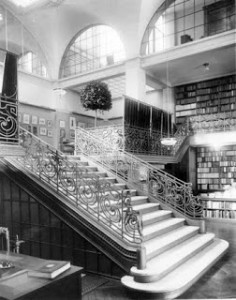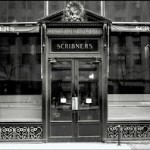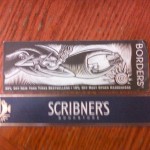Before the American Civil War, in 1850, Isaac Baker died. His business partner paid off the estate and repainted the sign out front to read – Charles Scribner Company.
He published books.
After the war, the company began publishing a magazine, and then another – in that grand age of monthly editions. Later, his sons joined the firm, and at the father’s death the company was renamed Charles Scribner’s Sons. Over time, it became simply – Scribner.
When an F. Scott Fitzgerald novel was published, it bore the Scribner imprint. Same with Hemingway. Scribner managed to corral a number of influential writers like Kurt Vonnegut, Thomas Wolfe, and Edith Wharton. Marjorie Kinnan Rawlings won a Pulitzer for The Yearling, published by Scribner.
Stephen King didn’t win any Putlitzers, but won over a legion of readers during his contract years with Scribner with works like Dreamcatcher and Under the Dome, the latter soon-to-be-released as a film adaptation.
The name Scribner survives, in a fashion. The imprint is now owned by former rival Simon & Schuster, which was in turn acquired by CBS Corporation. During its heyday, Scribner operated a chain of bookstores anchored by its flagship location on Fifth Avenue in New York City.
The store was a marvel to behold, evoking a grandeur reflecting the lofty position held by books and authors at the time. 597 Fifth Avenue was built expressly for the housing of Scribner’s Bookstore. A glass front stopped passersby, who peered through to take in the two story interior complete with a mezzanine, an architectural masterpiece done up in a Beaux Arts style exterior. There was a vaulted ceiling and sunlight filtered in through clerestory windows.
At its demise in 1988, the New York Times treated the news as an obituary: SCRIBNER BOOK STORE, 75, TO CLOSE NEXT MONTH. A descendent of the founder lamented the occasion, but by then his paycheck was backed by Macmillan publishing which acquired Scribner four years earlier.
”A chapter of history is about to close,” said Charles Scribner 3rd at the time. No longer strictly Scribner, Charles the Third served as a vice president at Macmillan.
The Scribner stores were eventually acquired by Barnes and Noble following the breakup of the Scribner publishing and retail divisions. The Utica Square Scribners book store in Tulsa lingered past the millennium, but I could find no obit in the Tulsa World archives. A book signing was hosted there in 2001 – the final mention I found – although relics exist, like the bookmark tucked into a recent acquisition.
A bit like viewing gravestones, they underscore the often-fleeting nature of success. Makes me appreciate even more the opportunity I have to serve as a proprietor in a similar establishment – even if we’re on the economic endangered species list.




Leave a Reply